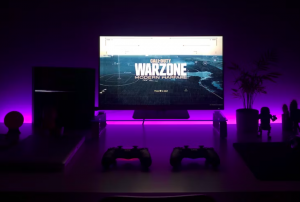Gaming Beast or Workstation Wonder? Find Your Perfect Computer
5 min read
Introduction
In today’s tech-centric world, computers have become indispensable tools for a myriad of activities, from gaming to professional work. However, not all computers are created equal, and two primary contenders dominate the market: gaming computers and workstation computers. But which one is right for you? In this article, we will explore the key differences between these computing beasts, helping you make an informed decision and find your perfect computer.
Understanding Gaming Computers
Gaming computers, often known as gaming rigs or gaming PCs, are designed to deliver exceptional performance and immersive experiences for gamers. These systems boast high-end hardware, such as powerful GPUs, to render visually stunning graphics and ensure seamless gameplay. They are optimized to handle resource-intensive gaming applications that demand rapid processing, high frame rates, and low latency. Gamers also seek cutting-edge cooling solutions to prevent overheating during intense gaming sessions.
The Power of Workstation Computers
On the other side of the spectrum, workstation computers cater to professionals engaged in demanding tasks like 3D modeling, video editing, and scientific simulations. These machines prioritize computing power, accuracy, and reliability over gaming aesthetics. Workstations boast robust CPUs with multiple cores and threads to handle complex calculations, making them ideal for rendering and simulations. Furthermore, they come equipped with professional-grade GPUs for accelerated graphics processing.
Key Differences between Gaming and Workstation PCs
While both gaming and workstation computers are powerful in their respective domains, several critical differences set them apart. Gaming PCs excel in delivering extraordinary visual experiences, emphasizing high refresh rates and eye-catching aesthetics. Conversely, workstation computers prioritize precision and stability, allowing professionals to tackle intricate tasks with ease. The choice between the two depends on the user’s primary use case and computing requirements.
Identifying Your Computing Needs
Before diving into the world of gaming rigs and workstations, it is crucial to identify your computing needs. Ask yourself questions like: Do I primarily use the computer for gaming or professional work? What specific tasks do I need it to perform? Understanding your requirements will help you make a well-informed decision when choosing the perfect computer.
Gaming Computers: Advantages and Limitations
Gaming computers are engineered to provide the ultimate gaming experience, offering top-tier graphics and smooth gameplay. The advantage lies in their ability to handle resource-heavy gaming applications and deliver jaw-dropping visuals. However, they may be overkill for general computing tasks, and their flashy designs may not suit a professional environment. Additionally, their high-power consumption might lead to increased electricity bills.
Workstation Computers: Advantages and Limitations
Workstation computers shine when it comes to data-intensive tasks, be it 3D modeling, video rendering, or data analysis. Their high-performance CPUs and GPUs ensure efficiency and accuracy in professional workflows. However, their hardware might be excessive for casual gaming, and their utilitarian appearance might not appeal to gamers seeking a visually appealing setup. Workstations may also be more expensive due to specialized components.
Performance and Hardware Components
Both gaming and workstation computers rely on specific hardware components to deliver optimal performance. GPUs play a crucial role in rendering graphics and enhancing visual fidelity in gaming PCs, while workstation GPUs focus on precision and scientific computing. CPUs, the brain of any computer, differ in terms of core count, clock speeds, and cache memory, catering to different computing needs. Adequate RAM and storage are essential for both, but workstation users might require more RAM for complex data handling.
Graphics Processing Units (GPUs)
GPUs are the workhorses behind rendering images and videos. For gaming PCs, high-end gaming GPUs from companies like NVIDIA and AMD offer incredible frame rates and real-time ray tracing capabilities. Workstations, on the other hand, rely on Quadro or Radeon Pro GPUs, optimized for professional applications like CAD and 3D rendering.
Central Processing Units (CPUs)
CPUs are responsible for executing instructions and calculations. Gaming computers often feature powerful gaming CPUs like Intel’s Core i9 or AMD’s Ryzen 9, offering high clock speeds and multitasking capabilities. Workstation CPUs, such as Intel Xeon or AMD Ryzen Threadripper, are designed for heavy workloads and parallel processing.
RAM and Storage
Adequate RAM is crucial for running applications and multitasking smoothly. Gaming PCs typically have sufficient RAM for gaming and everyday tasks, whereas workstations may require larger memory capacities for handling complex datasets and simulations. For storage, gaming rigs prefer fast NVMe SSDs for quick game loading, while workstations may utilize larger storage options like HDDs for data archiving.
Cooling Solutions and Power Consumption
As gaming and workstation computers push hardware to its limits, effective cooling solutions are vital to prevent overheating. Gaming PCs often employ liquid cooling or high-performance air cooling for efficient heat dissipation during extended gaming sessions. Workstations may also utilize robust cooling methods, considering the intensive tasks they handle.
When it comes to power consumption, gaming computers typically consume more electricity due to their resource-intensive nature. Workstations, designed for stability and power efficiency, may be more power-conscious.
Gaming Peripherals vs. Workstation Peripherals
The choice of peripherals can significantly impact the overall computing experience. Gamers often opt for high-refresh-rate monitors, mechanical gaming keyboards, and precise gaming mice to gain a competitive edge. Workstation users prioritize color-accurate monitors for visual fidelity and ergonomic peripherals for long hours of professional work.
Choosing the Right Computer for Your Needs
Selecting the perfect computer depends on a careful consideration of your usage and requirements. If gaming is your primary focus and you seek stunning visuals and immersive experiences, a gaming PC would be the ideal choice. On the other hand, if you are a professional handling complex tasks that require accuracy and efficiency, a workstation would be more suitable.

Conclusion
In conclusion, the choice between a gaming beast and a workstation wonder boils down to your computing needs. Gaming computers excel in delivering captivating gaming experiences, while workstation computers prioritize computational power for professionals. Understanding your primary usage and requirements will guide you towards finding your perfect computer, tailored to your specific needs.
FAQs
- Is a gaming computer suitable for professional work like video editing or 3D modeling? While gaming computers can handle some professional tasks, they might not offer the precision and stability required for complex work like video editing or 3D modeling. Workstations are better suited for such tasks.
- Can I upgrade a gaming PC to make it more workstation-oriented? While it is possible to upgrade certain components, such as adding more RAM or changing the GPU, transforming a gaming PC into a full-fledged workstation might not be cost-effective. It’s better to invest in a dedicated workstation if you need professional-grade performance.
- What are the advantages of a high-refresh-rate monitor for gaming? A high-refresh-rate monitor allows for smoother visuals, reduced motion blur, and a more responsive gaming experience. Gamers often prefer monitors with refresh rates of 144Hz or higher for competitive gaming.
- Are workstations only for professionals in specific industries? Workstations are commonly used in industries like engineering, architecture, animation, and scientific research. However, anyone involved in computationally intensive tasks can benefit from a workstation’s powerful performance.
- Can I build a custom computer that combines gaming and workstation capabilities? Yes, it is possible to build a custom computer that balances gaming and workstation capabilities. However, it might require careful selection of hardware components and might not excel in either category compared to dedicated systems.
Remember, finding the perfect computer involves evaluating your computing needs and striking the right balance between performance, aesthetics, and budget.






